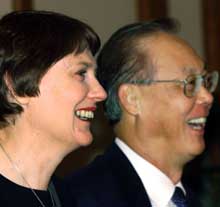|
|
|
B Clark signs trade deal, prepares for Apec (Photo shows Helen Clark with Singapore PM Goh Chok Tong) Helen Clark has signed a free trade agreement with Singapore despite the opposition of usual supporters of the Labour party and support from what is meant to be the parliamentary opposition. Ever the pragmatist, Helen Clark is going down the same path that started with her `peacenik' status being blowin away in the 1980's when she agreed to the infamous frigate purchases, a pro-people status and perception looks like going the same way as the PM moves rapidly toward the blue end of the political spectrum. At the signing, Miss Clark and Mr Goh urged progress on Apec's goals of voluntary free trade between developed countries by 2010 and developing nations by 2020. One can readily understand Mr Goh's position is supporting the dropping of trade tariffs, Singapore lives and breaths trade and has no compunction at using low wage economies in its immediate vicinity. But New Zealand is different, a country that lead the social reform process last Century and prides itself on a fair deal and pro-people and pro-environment politics. It is indeed sad and alarming to see a Labour PM starting to pick up the ball passed by the infamous Roger Douglas, long after that particular ball went flat. Needless to say Mr Goh said the trade agreement with New Zealand was a "milestone" in the two countries and he hoped it would act as a catalyst for trade liberalisation progress among the 21 Asia-Pacific Economic Cooperation (Apec) countries. He hopes the agreement will eventually form part of a web of similar trade agreements, ultimately spanning the Apec region. The prospects for that roll-out are high, especially if even a Labour Government in New Zealand is falling into line so soon. In the year since New Zealand and Singapore started their negotiations, there has been a succession of free trade initiatives in the region, with 17 of the Apec economies now party to or negotiating such agreements. Singapore was in talks with Mexico, while New Zealand was about to enter exploratory talks with Hong Kong. Nevertheless all is not true blue. While New Zealand and Singapore have been actively pursuing free trade, a division has emerged within the Apec grouping over the pace of trade liberalisation. The way is far from smooth for free-trade pro-privatisation pundits. Malaysia has led a group of countries opposed to Apec, issuing a strong message in favour of the World Trade Organisation (WTO) launching fresh liberalisation talks within a year. The demonstrations outside every world trade conference also attest to the flashpoint that free trade and privatisation have become. Helen Clark is experiencing a huge boost to her ego at the moment. After signing with Singapore Prime Minister Goh Chok Tong the two flew to Brunei to a red carpet welcome. Later, PM Clark was due to meet the Sultan of Brunei ahead of meeting the presidents of Korea and Mexico. She then heads into a retreat with 20 of the world's more powerful leaders, including outgoing United States President Bill Clinton. But, on the streets the credibility is fizzing away. Labour Governments is seems are fulfilling to the letter their karma. When the transparent pro-corporate policies of National have become too nauseating for most people to bear any longer, in steps Labour to calm the waters and get the climate right again for National to be re-elected. Its a dirty job, but someones got to do it? Why can we not for once get a leader who can stand up to threats and promises. Sure Mr Goh warned if some countries wanted to drag their heels on liberalisation, others like New Zealand and Singapore would pursue more rapid progress on their own, risking less attractive countries being left behind. But why buckle to such propaganda and start, as Helen Clark did, lauding the Singapore free trade deal as opening up exciting new possibilities for New Zealand. Exciting for who? Labour is isolating itself for a few pieces of gold. There is division within the Government's own ranks on the Singapore deal and the attitude to free-trade. Coalition partner the Alliance opposed the agreement when it was put to a vote in Parliament, while the Green party - which Labour needs for a parliamentary majority is in revolt, or should be. It was only due to support from National, which initiated negotiations, that the deal got through. The Alliance and the Greens are both concerned the deal will see Singapore used as back door entry into New Zealand for cheap goods from elsewhere in Asia. Clark and Goh rejected that outcome, saying there were strict rules in the agreement against that happening. PM Clark said the agreement brought New Zealand and Singapore much closer together and was a model for others to emulate. "This agreement shows our Apec partners what can be done to promote trade and economic growth. "The agreement is good for New Zealand, it is good for Singapore and it is good for the Asia-Pacific." Hmmm. |

